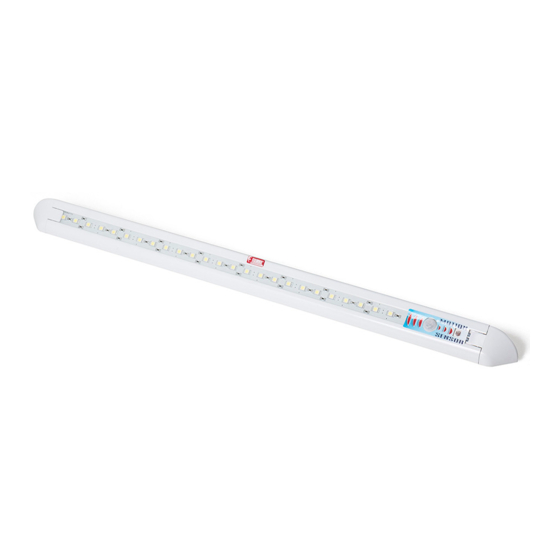Fiamma 98655-884 Petunjuk Instalasi dan Penggunaan - Halaman 10
Jelajahi secara online atau unduh pdf Petunjuk Instalasi dan Penggunaan untuk Peralatan Pencahayaan Fiamma 98655-884. Fiamma 98655-884 16 halaman. External/internal led light for awnings and garage facilities
Juga untuk Fiamma 98655-884: Petunjuk Instalasi dan Penggunaan (16 halaman), Petunjuk Instalasi dan Penggunaan (16 halaman)

COMFORT - Tech
Read the following instructions and warnings carefully; failure to observe these installation and usage
EN
instructions as well as the laws for driving in the relevant country may cause severe harm or damage for
which the manufacturer declines all responsibility.
The product has been designed and manufactured exclusively for the illumination of recreational vehicles,
is not suitable for the illumination of home environments. For safety reasons, it is advisable to always
disconnect the negative terminal from the batteries on the vehicle and then work without power during
installation. It is suggested to connect the power cable to the fuse box or to the terminal board and not
directly to the battery. Use the correct fuse for connection to the vehicle power supply according to EN
1648-1 and EN 1648-2. Installing an oversized fuse can cause overheating which can result in a short
circuit or malfunction of the entire electrical equipment. Choose the safest and shortest installation for the
power cable. Reduce the length of the power cable as necessary.
Use only cable clamps suitable for the diameter of the power cable for connection to the terminal board. If
incorrect terminals are used, this could cause a voltage drop and increase the formation of heat on the terminal.
It is strictly forbidden to go around with the LED lights on; connect the power supply in order to inhibit
current fl ow while the vehicle is running.
We do not recommend prolonged periods of viewing at close proximity of the LED strip.
The manufacturer will not be held responsible for claims for damages resulting from the following:
- Defective installation or connection of the product.
- Damage to the product caused by mechanical infl uences and overvoltage.
- Alterations on the device without the express authorization of the manufacturer.
Lesen Sie sich die folgenden Anweisungen und Warnhinweise sorgfältig durch. Die Nichtbeachtung
DE
dieser Montage- und Nutzungsvorschriften sowie der Bestimmungen der Straßenverkehrsordnung
im Einsatzland kann zu schwerwiegenden Schäden führen, für die der Hersteller keine Verantwortung
übernimmt. Das Produkt wurde ausschließlich für die Beleuchtung von Freizeitfahrzeugen entworfen und
eignet sich nicht für die Beleuchtung von Wohnungsumgebungen.
Aus Sicherheitsgründen wird empfohlen den Minuspol immer von der Batterie zu trennen und somit bei
der Anbringung ohne Strom zu arbeiten. Es wird empfohlen, das Netzkabel an den Sicherungskasten
oder das Klemmbrett und nicht direkt an die Batterie anzuschließen. Verwenden Sie die richtige
Sicherung für den Anschluss an das Bordnetz gemäß EN 1648-1 und EN 1648-2.
Die Installation einer überdimensionierten Sicherung kann zu einer Überhitzung führen, die zu einem
Kurzschluss oder einer Fehlfunktion des gesamten elektrischen Geräts führen kann. Wählen Sie den
sichersten und kürzesten Installationsort für das Netzkabel. Reduzieren Sie die Länge des Netzkabels
nach Bedarf. Verwenden Sie für den Anschluss an die Klemmleiste nur Kabelbinder, die für den
Durchmesser des Stromversorgungskabels geeignet sind. Bei Verwendung falscher Klemmen kann es
zu einem Spannungsabfall und damit zu einer erhöhten Wärmeentwicklung an der Klemme kommen.
Es ist strengstens verboten, mit eingeschalteten Led-Leuchten zu fahren; schliessen Sie daher das
Netzteil an, um den Stromfl uss während der Fahrt zu unterbinden.
Wir raten davon ab, aus nächster Nähe lange in das Licht der LED-Leiste zu schauen.
Der Hersteller haftet nicht für Schadenersatzansprüche, die sich aus dem Folgenden ergeben:
- Fehlerhafte Installation oder fehlerhafter Anschluss des Produktes.
- Produktschäden verursacht durch mechanische Einfl üsse und Überspannung.
- Änderungen am Gerät ohne ausdrückliche Genehmigung des Herstellers.
Lire attentivement les instructions de montage suivantes. Le non-respect de ces conseils d'installation
FR
ou d'utilisation mais aussi des normes relatives au code de la route du pays dans lequel vous circulez
peuvent causer de graves dommages qui ne pourront aucunement engager la responsabilité du
fabricant. Ce produit a été conçu et réalisé exclusivement pour l'éclairage des véhicules de loisirs ; il ne
convient pas pour un éclairage domestique. Pour des raisons de sécurité, il est conseillé de toujours
déconnecter la borne négative des batteries du véhicule et donc de procéder hors tension à l'installation.
Il est recommandé de brancher le câble d'alimentation à la boîte à fusibles ou à la barrette de
raccordement et pas directement à la batterie. Utiliser le fusible adapté pour le raccordement à
l'alimentation du véhicule selon les normes EN 1648-1 et EN 1648-2. L'installation d'un fusible
surcalibré peut provoquer une surchauffe qui à son tour pourra entraîner un court-circuit ou un mauvais
fonctionnement de l'appareil électrique dans son intégralité. Choisir le parcours d'installation le plus sûr
et le plus court pour le câble d'alimentation. Raccourcir le câble d'alimentation en fonction des besoins.
Utiliser exclusivement des serre-câbles adaptés au diamètre du cordon d'alimentation pour le
branchement à la barrette de raccordement.
Si des bornes non adaptées sont utilisées, une chute de tension pourrait se produire ce qui
augmenterait la formation de chaleur sur la borne.
Il convient de rappeler qu'il est strictement interdit de rouler avec les lumières LED allumées ; effectuer
le branchement de façon à bloquer l'alimentation pendant que le véhicule est en marche.
Il est déconseillé de regarder de façon prolongée et de très près la bande à LED.
La responsabilité du constructeur ne pourra être engagée pour des dommages dérivant :
- d'une mauvaise installation ou d'un mauvais branchement du produit
- de dégâts générés, à leur tour, par un problème mécanique ou une surtension
- des modifi cations apportées au dispositif sans l'autorisation expresse du constructeur
10
